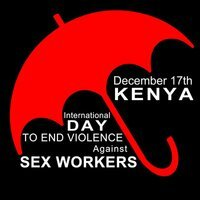Are you defined by your job? Sure, your spouse might say you are married to your work, and may have considered filing a missing person’s report because you’re on the job all the time. But: is your job what defines you?
For most of us, I think that while we sometimes are rather anxious when we don’t have our work to do in front of us, we would be loathe to limit ourselves to one definition. For myself, founding my own organization has been the out-working of an inner journey, and I have certainly put my heart and soul into ZanaA. Yet, I am also an avid photographer and cook, a voracious reader, and relationally a daughter and sister – and now wife.
So why do we label sex workers as only that? Do we think about the mom who left an abusive relationship and is trying to put bread on the table for her young children, who comes home and tucks her children into bed? Do we think about the teenager who is trying to support an invalid mom and to send several dependent siblings to school? Do we think of her hopes and aspirations? Do we think of her as having dignity, and human rights like we have? Do we think of her as we think of our own mom?
Tomorrow we honor sex workers with an international day to end violence against them. There are many complex factors involved in sex work, but one thing they must all be given is safety from harm. What you may not know is that prostitutes are responsible about their health – a recent study in Kenya found 92% knew their HIV status. However, their clients are not responsible.
A recent study of sex workers in Kibera slum, where ZanaA works, found that of 161 prostitutes interviewed, in an average of 30% of sexual acts male clients refused to wear a condom and could be abuse if pushed or refused (20% of these acts were with a prostitute who was HIV+ – she was not trying to protect herself alone but to protect him). Common reactions by men who are soliciting for sex, when asked to use a condom, are rape, burning women’s genitals with cigarettes, or worse. Girls are at greater risk for many reasons, but are futher impaired by reduced negotiating skills when trying to handle older men.
The clients are not the only ones complicit in this abuse. Prostitutes point to police and law officials as “the main source and cause of the brutality they are experiencing.” It is this brutality and the discrimination by the society that is making it difficult for prostitutes to come out and share their tribulations. Society is you and me. Do we really love this woman, our neighbor, as we are called to do? If we see her on the street at night, do we glare with contempt or do our eyes speak of warmth and our heart whisper a prayer of support to God for her and her family? Are we someone she could come to if she were in trouble?
Let me note: You don’t have to be a sex worker to experience sexual violence. At Harvard, I had two upstanding, talented friends from respectable families who had been raped by their boyfriends during high school, sometimes repeatedly, and felt they had nowhere to turn or were too afraid of the boy to speak up. I had another friend who was being recruited on wall street and, on a night out with the boys, was ruffied and raped. My own sister, at college, was slipped a ruffie, but thankfully her female friends saw her symptoms and took her home.
Violence against women exists in every walk of life, every town and city. It is shrouded in shame, self-doubt and silence, which makes the perpetrators more powerful than they should be. Prostitutes, for instance, because of the stigma against them are unable to access support systems. Said one woman who is my age and a mother of two:
“Many of us feel the society does not love us… if you love and appreciate our human rights, then we are likely to have self-esteem and listen to what the society is saying.” The Daily Nation, 14 December 2010
I have some great friends. Some of them are sex workers. Some of them are children of sex workers. Some of them work to help sex workers. Some of them are survivors of gender-based violence.
This holiday, lets wash the windows of ignorance in our hearts and minds to see clearly just who is our neighbor and what it takes to love them truly.
Take Action
This holiday, you can take action to help girls break out of the cycle of poverty, abuse, and prostitution.
Here are a few simple ways:
- Rally: Show up in Nairobi, 17 December 2010, for – it’ll be a powerful day of marching, dance, spoken word, testimonies, and action
- Read: A great book by my friend Zawadi, When I dare to be powerful: On the road to a sexual rights movement in East Africa (click the title for a downloadable pdf)
- Listen: Hear the short, personal story of a prostitute in South Africa:
- Rewind the clock: – watch our partner The Girl Effect’s latest video: the clock is ticking for girls (below)
- Donate: Give girls a chance to stay in school and avoid prostitution – get involved in our Forever550 campaign yourself or with friends and family.





Comment From buy art poster
January 9, 2011
Real clear site, thankyou for this post.
Comment From cieaura
January 11, 2011
I truly appreciated this posting. It is good when one come across something of which is not necessarily simply educational but amusing. Superb
Comment From
January 14, 2011
Hello there, I found your web site by way of Google at the same time as searching for a related matter, your website came up, it appears to be like great. I’ve bookmarked it in my google bookmarks.